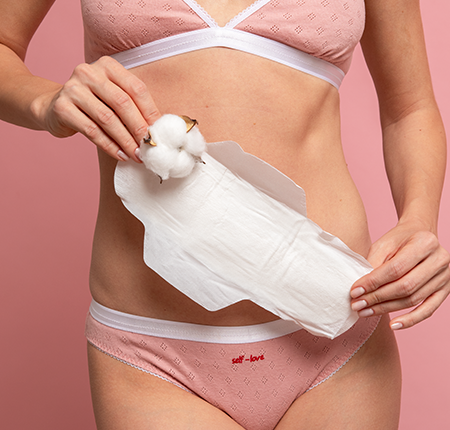
The entire first half of your menstrual cycle is the follicular phase. In other words, you spend about half of each month in this phase, so it's important to understand what's going on with your body during these days, and especially how specific hormonal fluctuations affect you.
In this article, we talk about what the follicular phase is, how it works, and how you can naturally support your body throughout this important stage of your cycle.
What is the follicular phase?
The follicular phase is one of the four phases of the menstrual cycle, the one when a new egg reaches maturity in the ovaries.
This process occurs as a result of hormonal changes that occur in your body every month throughout your reproductive life, in order to prepare you for a possible pregnancy. Thus, the follicular phase begins on the first day of menstruation and ends with ovulation, followed by the luteal phase and the next menstruation, when a new cycle and a new follicular phase begin.
During menstruation, the body sheds the thickened uterine lining through vaginal bleeding. Menstrual bleeding usually lasts between 3 and 7 days, during which you can use 100% organic cotton pads and tampons to feel comfortable and safe, and to avoid staining your clothes.

The first day of menstruation also begins the follicular phase, when ovarian follicles develop and an egg matures. This phase lasts until ovulation.
During ovulation, which lasts only 24 hours, the ovary releases the mature egg into the fallopian tube, where it can be fertilized to begin a pregnancy.
Immediately after ovulation, the luteal phase follows, and the follicle that released the egg produces hormones that stimulate the thickening of the uterine lining (endometrium), creating a favorable environment for pregnancy. If fertilization does not occur and there is no pregnancy, this endometrium will be eliminated during the next menstruation and a new menstrual cycle will begin.
How to Know You're in the Follicular Phase - Signs & Symptoms
Unlike menstruation, where menstrual bleeding is a very visible and clear symptom, the follicular phase doesn't have as obvious specific symptoms. However, there are a few changes in your body that can let you know you're in the follicular phase.
For example, if you take your temperature every day when you wake up in the morning, this can be a clear indicator of your menstrual phase. During the follicular phase, your temperature should be somewhere between 36.1 – 36.45℃, and it may rise slightly during ovulation and the luteal phase.
Also, due to the hormonal fluctuations that occur during this period, other signs that you are in the follicular phase may be:
- Increased energy levels, motivation and mental clarity.
- Increased libido and improved mood.
- Changes in cervical mucus (during the follicular phase, vaginal discharge is whitish, milky, and has a creamy, thicker texture).
What happens in the follicular phase?
As a woman, you are born with a certain ovarian reserve. There are about one million eggs in your body at birth, but this reserve decreases as you age. And with the onset of your first period, your body begins the process of maturing these eggs.
So, with each menstrual cycle, about 11-20 eggs begin to mature during the follicular phase. And after each follicular phase, only one of these eggs fully matures:
- The pituitary gland releases FSH (follicle-stimulating hormone), which stimulates the ovaries to produce ovarian follicles, those fluid-filled sacs in which eggs can mature.
- A dominant follicle is formed, which develops faster than the others and which allows the egg it contains to do the same to fully mature until ovulation.
- The dominant follicle releases more estrogen into the body, stimulating the thickening of the uterine lining to support a possible pregnancy.
- The increased estrogen level leads to a decrease in FSH levels, which stops the other follicles from developing and allows them to be reabsorbed into the body while the dominant egg fully matures.
How long does the follicular phase last?
The follicular phase is the longest phase of the menstrual cycle and can last between 14 and 21 days. Its duration depends on the time it takes for the egg to reach maturity. The process begins on the first day of menstruation and ends on the day of ovulation.
The difference between the follicular phase and the other phases of the menstrual cycle
The follicular phase differs from the other phases of the menstrual cycle in numerous ways.
Functionally, the follicular phase is the period in which follicles develop in the ovaries. At ovulation, the mature egg is released from the ovary.
From a hormonal point of view, estrogen levels increase in the follicular phase, while progesterone levels increase in the luteal phase.
In terms of positioning as a duration within the menstrual cycle, the follicular phase occurs in the first half of the cycle, between days 1-14. While ovulation occurs on day 14, and the luteal phase in the second half of the cycle, respectively days 15-28.
And, of course, the way you feel is very different in the follicular phase compared to the other phases: you have increased energy and productivity, a better mood, and a higher sex drive due to increased estrogen levels.

What is good to do during the follicular phase?
Since the follicular phase is one of the most productive periods of your menstrual cycle, when energy levels and mental focus improve as estrogen levels increase, here's how you can adapt your lifestyle to be in harmony with the changes taking place in your body:
- Consume foods that support estrogen production, such as green vegetables, flax or sesame seeds, fresh fruits, and fermented foods.
- Practice various physical activities, including more intense strength training or cardio, suitable for a high energy level.
- Take advantage of mental clarity to focus on your projects, as the brain is in an ideal state for planning, learning, and creative activities.
How to support the follicular phase naturally
As your body prepares for ovulation, the follicular phase provides the perfect opportunity to take extra care of yourself. Support this stage by prioritizing rest, eating nutritious foods, and implementing habits that contribute to hormonal balance and regeneration.
Stress management and quality sleep
High levels of stress can affect your hormonal balance and follicle development, so how you manage it is important. You can try relaxation techniques such as conscious breathing, meditation, yoga, or nature walks. The quality of your sleep also matters, so try to get at least 7-8 hours of sleep a night.
Possible supplements
Certain supplements, such as Omega-3, vitamin B6, zinc, or magnesium, can help support hormonal balance and support the liver in metabolizing estrogen. But always talk to your doctor to see if such supplements can help you, and never start taking supplements (even simple vitamins) without a prescription.
Body observation and menstrual cycle tracking
Pay attention to how your body communicates with you. Track changes in your cervical mucus, temperature, mood, and energy levels to know exactly what phase of your cycle you're in. These signs can be especially important if you're trying to track your fertile window and get pregnant.
Imbalances and signs that the follicular phase is not functioning optimally
When something goes wrong during the follicular phase, it's not just your energy levels and emotional balance that suffer, but your fertility and overall health as well. But how do you know when something isn't working optimally?
Among the most common signs of imbalances in the menstrual cycle and follicular phase are:
- Irregular menstruation or absent menstruation ( amenorrhea ): may indicate a prolonged follicular phase or lack of ovulation.
- Delayed or absent ovulation: in the absence of ovulation, an excessively long follicular phase will occur, which can affect your hormonal balance.
- Symptoms of too low or too high estrogen levels: including mood swings, headaches, acne, and breast tenderness.
When to see a doctor during the follicular phase
It's normal for menstrual cycle symptoms and even the length of the follicular phase to vary slightly, even from month to month. However, if there are persistent symptoms or alarming signs, it's important to see a doctor to detect and treat any imbalance early.
Visit your gynecologist as soon as possible if you notice that:
- You have very short or very long menstrual cycles.
- You haven't ovulated for several months.
- Intense symptoms appear (severe acne, severe abdominal pain, irregular bleeding).
You try to get pregnant and fail after 6-12 months.

Frequently asked questions about the follicular phase
Like anything else related to your body and health, the follicular phase can raise many questions, especially if you're tracking your menstrual cycle or experiencing unusual symptoms. In this section, you'll find clear answers to the most frequently asked questions about this stage of the cycle.
Can you ovulate if your follicular phase is very short?
Yes. Although it is rare, it is not impossible to ovulate even when the follicular phase lasts between 10 and 14 days. However, a short follicular phase can lead to early ovulation, which can affect egg quality and your chances of conception.
Early ovulation is not a problem if you ovulate regularly. However, if you notice that you are repeatedly having short follicular phases, it is recommended that you monitor your menstrual cycle and talk to a specialist, especially if you want to get pregnant.
How do contraceptives influence the follicular phase?
Hormonal contraceptives suppress the natural follicular phase by inhibiting ovulation. Basically, they prevent follicle development in the ovaries and keep estrogen levels under control.
What does the follicular phase have to do with polycystic ovary syndrome (PCOS)?
In women with polycystic ovary syndrome , the follicular phase is often affected by hormonal imbalances that prevent proper follicle maturation and ovulation. This can lead to irregular or absent cycles.
What hormonal tests are done in the follicular phase and on what day?
Hormonal tests that measure FSH, LH, estradiol, and prolactin levels are usually recommended during the first days of the follicular phase (days 2-5 of the menstrual cycle). These tests can provide important information about ovarian function and hormonal balance.
Is it normal to have no cervical mucus during the follicular phase?
During the early days of the follicular phase, it is normal for cervical mucus to be absent or very thin. As estrogen levels rise and ovulation approaches, the mucus should become more abundant, clear, and stretchy, resembling egg white. A complete lack of mucus over the long term may indicate a hormonal imbalance.
Can you get pregnant during the follicular phase?
Yes. The likelihood of pregnancy is lower at the beginning of the follicular phase, but increases as you get closer to ovulation. Sperm can survive in the reproductive tract for up to 5 days, so having sex towards the end of the follicular phase can lead to conception. The 5 days before ovulation, as well as on the day of ovulation, are when you have the highest chance of getting pregnant.
Photo source: Pexels.com






















